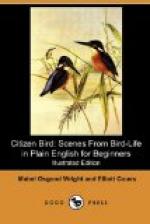“The Redwings are sociable birds, nesting in small colonies, and when once settled they never seem to stray far from home. The nest is a thick pocket hung either between reeds over the water, or fixed to the upright stems of a bush, quite near the ground, if the place is very marshy.
“The Redwings place their nests where it would seem very easy to reach them; but really the bushes are either surrounded by a little creek, hidden deep in the reeds, or the ground is so marshy that neither man nor beast can come near. That is the one reason why the males fly about so boldly, showing their glossy uniforms with the red and gold epaulets. When we try to visit that group of alders, where the colony lives, you will see for yourselves how nicely it is protected.
“We welcome this Blackbird in the spring, because his is one of the earliest bird-notes. In autumn, when he leaves the marsh and brings his flock to the grain-fields, we do not like him quite so well; but the Wise Men say that even then he is a good fairy in disguise, eating cutworms, army-worms, and other injurious kinds; even when stealing a bit of green corn, they think he clears away the worms that bore under the husks.”
[Illustration: Red-winged Blackbird.]
The Red-winged Blackbird
Length nine and a half inches.
Male: glossy black, except the scarlet shoulders, edged with buff. Female: mixed rusty black and buff, with dull reddish-orange shoulders—not conspicuous.
A Citizen of North America in general.
A member of the guilds of Ground Gleaners and Tree Trappers.
THE PURPLE GRACKLE
(THE CROW BLACKBIRD. RUSTY HINGE)
“What a noise those Blackbirds are making!” said Nat.
“That’s nothing to the way they do early in the spring, or in autumn, after they are through nesting,” said Rap. “You should hear them. They come to a big chestnut across the road from our house, more than a hundred of them at once, and they creak and crackle and squeak till all of a sudden down they go on the ground, and walk about awhile to feed.”
[Illustration: Purple Grackle]
“Yes,” said the Doctor, “I call them Rusty Hinges, for their voices sound like the creaking of a door that needs oiling on the hinges. But in spite of this they try to sing to their mates in spring, and very funny is the sight and sound of their devotion. To judge only by their notes, they should belong to the Croaking Birds, and not to the Singers at all; but they have a regular music-box in the throat, only it is out of order, and won’t play tunes. Like the Redwings, they also nest in colonies, either in old orchards, cedar thickets, or among pines; the rest of the year, too, they keep in flocks. Except in the most northerly States Crow Blackbirds stay all winter, like Crows themselves. They are not particularly likable birds, though you will find they have very interesting habits, if you take time to watch them.”




